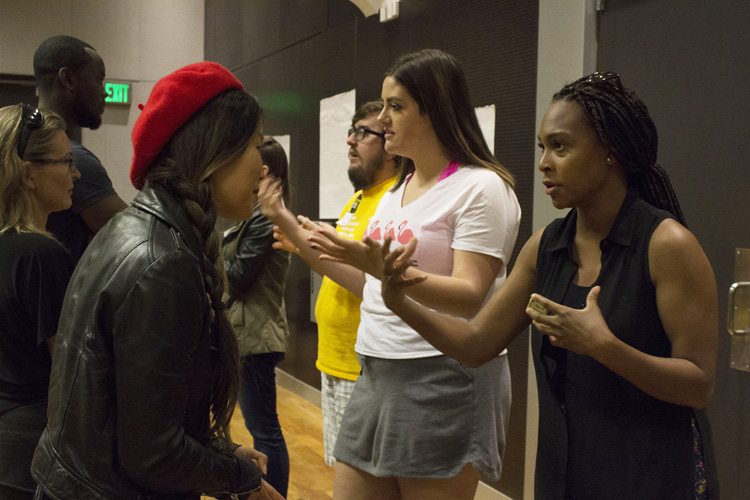A student singing project. A short film. A dance concert on the library lawn. A collection of skydivers’ stories about sexual misconduct.
These were among the concepts discussed at the kickoff event this week for Arizona State University’s CounterAct initiative, which aims to launch 880 creative actions to counteract the 880 acts of sexual violence that occur in the United States each year.
The idea was born in 2014 when a steering committee at ASU met to talk about ways to combat sexual violence, said the initiative’s creative directors, Elizabeth Johnson and Nik Zaleski.
“There was a sort of moment in that steering committee where the room really began to understand that in order to address a cultural problem, we had to use cultural solutions,” Johnson said. “The arts and design and creative practices are really potent tonics for addressing and responding to sexual violence.”
ASU students, staff and faculty members will be able to apply for seed grant money through the initiative, which is completely funded by through the university. The grants will range from $200 to $1,200.
Steven Tepper, dean of the ASU Herberger Institute of Design and the Arts, which is helping promote the effort, emphasized that the creative actions are an effort to create cultural change on college campuses, where 1 in 5 female students and 1 in 16 male students are sexually assaulted, according to the National Sexual Violence Resource Center.
“ASU, the most innovative school in the nation, wants to be innovative in this area as well,” Tepper said.
Johnson and Zaleski encouraged openness and support among the 100 or so participants, who wrote their preferred pronouns on name tags and sat at tables next to conversation cards with such questions as “What is one CounterAction you have seen or witnessed?” and “What do healthy relationships look like at ASU?”
Djuan Porter, a freshman at ASU majoring in theater, is gender fluid and goes by any “respectful” pronouns – he/him, she/her or they/them. Porter said initiatives such as CounterAct are important because they allow victims of sexual violence to share stories that could help others who are struggling.
“Art in itself, at least to me, art in itself is a way to tell your story,” Porter said. “It’s your opportunity to tell your story, your experiences, your thoughts, your feelings and let them be made public.”
Porter hopes to collaborate on a singing project with a dorm-room neighbor who has his own production studio.
“I think it’d be really cool if all of us kind of us came together on one music project talking about like, ‘Your voice matters, let your voice shine,’” Porter said. “We could come up with some very powerful, meaningful lyrics but also have amazing music to go with it.”
Speakers included Deana Garner, the senior associate athletic director, who spoke of efforts to train athletes about sexual violence. Kelly Davis, an associate professor at the College of Nursing and Health Innovation, discussed her research into alcohol’s psychological influence on incidents of assault.
Retha Hill, executive director of the Digital Innovation and Entrepreneurship Lab at the Cronkite School of Journalism, spoke about an Alexa app that she plans to integrate into student curriculum next year, to raise awareness about sexual violence.
At the event, students wrote down answers to the question, “Hey Alexa, what is one thing I can I do to prevent sexual violence today?” Those answers, the organizers said, will be incorporated into the app. Hill hopes to have 365 answers to that question, one for each day.
Later, participants broke into groups for a line-dance style exercise to brainstorm creative actions.
Keynote speaker Tani Ikeda, an activist and filmmaker, shared her personal experience with sexual violence and showed a short film. Ikeda founded the #SurvivorLoveLetter project, which encourages sexual assault survivors to share their stories in creative ways.
Ikeda ended her speech with a simple statement.
“To love yourself is to become free,” she said, her voice swelling with emotion.




